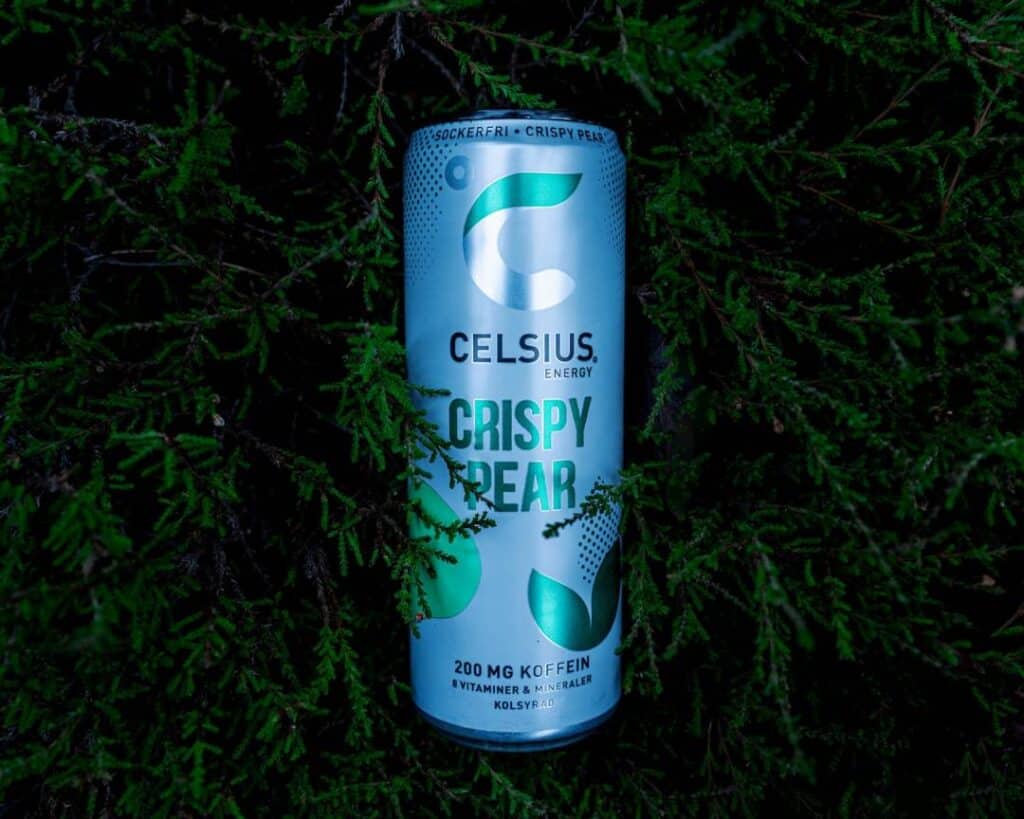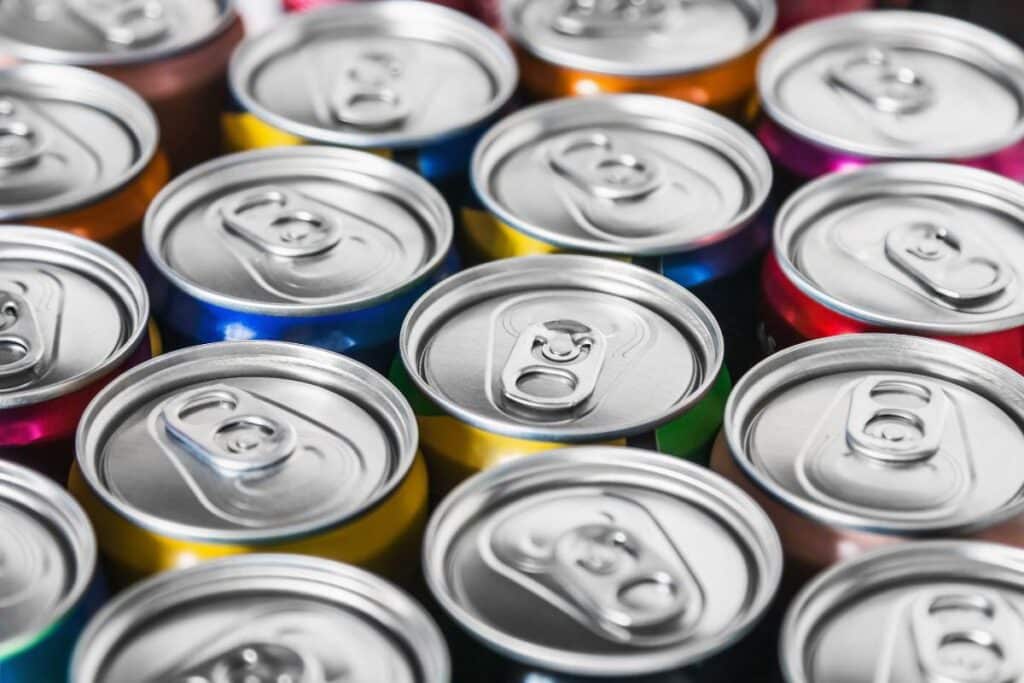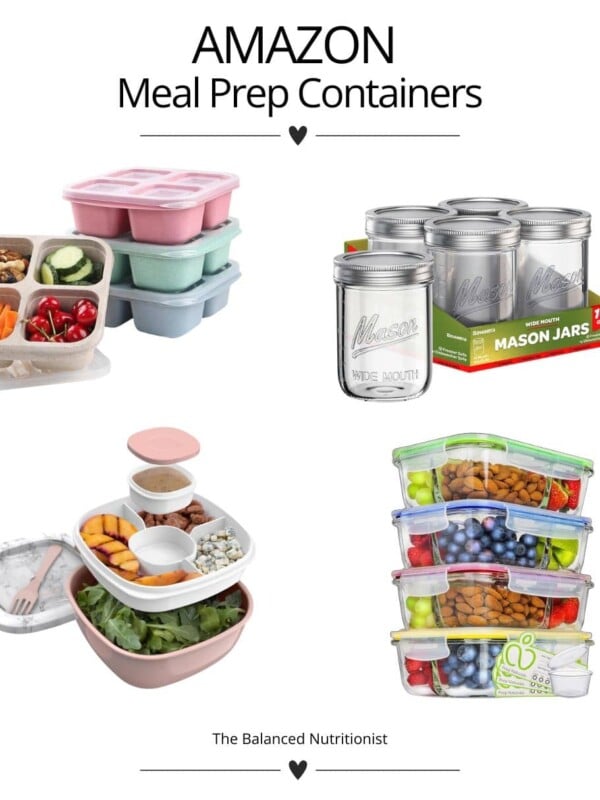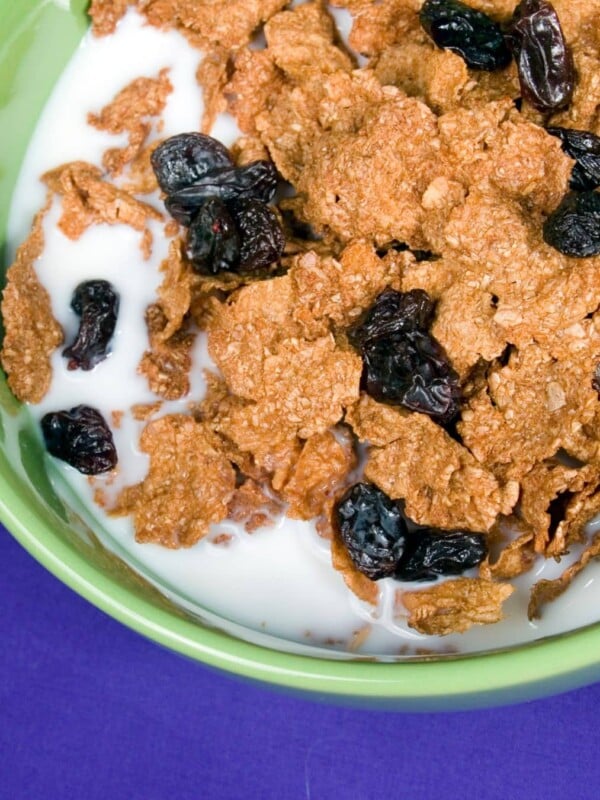This post may contain affiliate links. Please read our disclosure policy.
I’ve been getting this question more and more lately, in my IG DMs, from friends, and in my emails. Everyone wants to know: is Celsius bad for you? Is it actually a healthy energy drink?
I’m a Registered Dietitian, and I’m here to give my professional answer. In this blog post, I’ll walk you through what it is and if you should be worried about drinking it.

What is a Celsius energy drink?
Celsius is a popular energy drink with a stacked ingredient list and lots of claims of health benefits. Celsius claims to give you energy, accelerate your metabolism and burn body fat right on the can.
Among the ingredients are green tea extract, guarana seed extract, caffeine, taurine, glucuronolactone, ginger extract, and green tea leaf extract.
What’s in it?
Celsius drinks have 10 calories, most have zero grams of carbohydrates and a can has between 200-270mg of caffeine. There’s also vitamin C and a bunch of B vitamins, too. Let’s separate fact from fiction as we investigate some of the most notable ingredients in the lineup.
- Green tea extract. Green tea leaf extract offers caffeine for an energy boost. Green tea extract does come with some potential health benefits mostly because it’s high in antioxidants.
- Guarana seed extract. Guarana is a plant from the Amazon rainforest that contains caffeine and other active compounds. It’s rich in caffeine (seeds have 2x the caffeine concentration of coffee beans) which adds to the boost of energy and alertness that you get from Celsius. It’s a very common ingredient in energy drinks.
- Ginger root. Ginger or ginger extract has potential anti-inflammatory properties and can also support digestion.
- B vitamins. B vitamins don’t give you energy directly, but they’re part of the process of getting the energy that comes from carbs, fats, and protein. If you’re deficient in these vitamins, taking a supplement might give you a quick energy boost. If your body has enough, additional supplements aren’t going to do much.
- Taurine. An amino acid commonly added to energy drinks. It plays roles in hydration, immune function, and digestion. But since your body makes enough on its own, supplementation isn’t usually necessary.
- BCAAs (L-Isoleucine and L-Leucine. Celsius also includes some branched-chain amino acids for fitness appeal, as they play a role in muscle recovery and exercise support.
Caffeine In Celsius
Celsius Energy Drinks vary in their caffeine content, and range between 200-270 milligrams of caffeine per can. That’s significantly more caffeine than a typical cup of coffee (about 95 milligrams) and even some other energy drinks like Red Bull (80 milligrams).
Keep in mind though that when we are talking about a cup of coffee, we’re talking about a true, 8 oz cup of coffee. Most of the mugs in our kitchens are WAY bigger than that, and what you’re grabbing from Dunkin’ or Starbucks are often much bigger too (a grande cup of coffee at Starbucks is 310mg).
Even so, the high caffeine content in Celsius drinks might be too much for those with caffeine sensitivity. If you’re drinking other caffeine sources (coffee, tea, soda) in addition to these energy drinks, you’re looking at potential side effects like shakiness, headaches, fast heart rate, and anxiety from excessive caffeine consumption.
Sweetener In Celsius
These energy drinks have no added sugar, but they do use artificial sweeteners, specifically sucralose in most of them. They have a line that uses stevia too, if sucralose isn’t your thing.
Now that we know what is in Celsius – what’s the verdict? Is this drink good for you? And do the claims hold up? Let’s dive into the science, together.

Is drinking Celsius good for you?
Right on the front of the can Celsius claims to provide “essential energy, accelerates metabolism, and burns body fat”. Those are some pretty exciting sounding claims.
Celsius does have some peer-reviewed research to back up some of the claims that they make on their website – let’s take a look at their research studies.
Does Celsius Boost Your Metabolism?
Celsius may actually boost your metabolism a bit. There’s a small study from 2010 that explored how Celsius impacted sedentary men in their experience with exercise. Basically, the group of men was either given Celsius to drink or a placebo drink and instructed to exercise or not for ten weeks.
The study found that the men who exercised and drank Celsius had more improvement in their physical fitness than the men who did not have Celsius.
That’s definitely interesting! But it’s important to note that your metabolic rate is impacted by a lot of different things, and an energy drink is likely not the cure. PS- I have an entire blog post about metabolism, here!
Does Celsius Improve Performance?
Yes, a bit, but this is not unique to Celsius.
Any time you have some caffeine prior to exercising, your performance may increase a little and your pain tolerance may be higher as well.
So if you’d rather have a a cup of coffee as your “pre-workout” , that’s a reasonable choice that might cost less than Celsius and have less added ingredients, too.
Also, while I admire that the company is funding research, we do have to keep in mind that the studies are small. More research is certainly needed to back up the claims that are plastered right on the front of their cans.
The big picture is that your health and physical fitness is impacted by all of the choices you make every single day, not just a single drink or supplement.
No single drink will represent your whole potential for weight loss or wellnes. What you eat the rest of the time matters, as do your other wellness habits such as movements, stress reduction, and getting a good night’s sleep.
Are Celsius drinks bad for you?
For most healthy individuals (healthy adults, not kids), Celsius is likely okay in moderation.
But it’s important to note that there’s a pretty high amount of caffeine in all Celsius drinks. The can even comes with the warning “Do not exceed (2) servings per day. Not recommended for people who are caffeine-sensitive. Children under 18, or women pregnant or nursing.”
If you have any health conditions, especially heart conditions, I’d pass. Either way, it’s always a good idea to check with your doctor before adding in any type of caffeinated drinks or supplements that have proprietary blends (especially if you have health issues).
They’re marketed as sports drinks, but the benefits may not outweigh the risks. Marketers are there to sell products – they’re not health professionals.
The biggest piece of missing information is not just what is in the can, but how much.
What does proprietary blend mean?
We’ve chatted through what some of the main ingredients are in Celsius energy drinks but we haven’t yet covered one important factor in determining how well an energy drink can boost your metabolism or athletic performance: how much of these ingredients are in each can?
What should be a simple answer, isn’t.
In short: we don’t know how much of these ingredients are in the can because they’re a “proprietary blend” which means that the manufacturer keeps their secret recipe, well, a secret.
This helps to prevent other companies from mimicking their product, but it also prevents us from knowing if these drinks are actually safe or effective for what they claim to do.
That means we know that yes, there is ginger in the can, but is it actually enough to have any meaningful impact on your body’s inflammatory response? We can’t say, because we don’t know if the dose of ginger is enough.
How Much Is Too Much?
Follow the can’s warning. CELSIUS advises no more than two 12-oz cans per day (or one Essentials). Not for kids, pregnant/nursing individuals, or those sensitive to caffeine.” And be careful if you’re having additional caffeine sources!

What about that lawsuit?
Celsius settled a class action lawsuit related to labeling. They have marketed their drinks as “preservative free” but they do include citric acid, which is a preservative.
Celsius’ position is that the ingredient is not included in the drink as a preservative, but rather as a flavoring. But regardless, it is a preservative, even if they aren’t adding it for that purpose. Citric acid is incredibly common in our foods and drinks.
Celsius has now updated its labeling with a note after its ingredient list stating that the citric acid is there for flavoring, not as a preservative.
In the end I don’t see this as a big deal, but does highlight how many brands choose to market their products to be the most appealing, even if it’s a little bit confusing to consumers.
TLDR: There Are No Magic Solutions
As frustrated as we can all be when we are trying to manage our health, eating, and weight, I completely understand the desire for a quick fix. Marketers know that too, which is why they’re so creative and careful in how they promote products… “this is the one thing you’ve been missing!”
But the truth is, there are no magic solutions or quick fixes when it comes to health. Health and wellness is the sum of all of your habits, positive and not-so-positive.
This is good news: there is wiggle room in health to enjoy those fun foods. Health and wellness (and even weight loss) is not all about deprivation or forcing yourself to eat foods you don’t like. We get to enjoy our eating, too.
If the Celsius energy drink is something that you like, you enjoy the caffeine boost, and it fits in your budget – go for it, in moderation.
If you don’t really like them, prefer to get your caffeine from good old-fashioned coffee, and don’t want to spend a good chunk of your grocery budget on this drink – skip it. You don’t need it to improve your metabolism or your workouts.
I’m here to protect you from misinformation. This isn’t the first time I’ve reviewed products that folks are talking about online and I’m sure it won’t be the last. Here are a few other products that I’ve reviewed lately:
- Olipop vs. Poppi – A Dietitian’s Prebiotic Soda Review
- Oats Overnight Review: A Dietitian’s Honest Take
- Are Greens Powders A Waste Of Money? A Dietitian’s Review
- AG1 Athletic Greens – Review from a Dietitian
That’s a wrap
These celsius beverages are not weight loss, fat-blasting, metabolism-boosting magicians.
Drinking this drink, in combination with exercise, might just turn the metabolic dial up a tad, but you definitely don’t have to have this drink in order to be successful with your weight loss or fitness efforts. It is just a modest tool with a bigger price tag.
If you do choose to drink Celsius – enjoy! Just have realistic expectations for what one choice of many can do to make or break your health and wellness goals (and keep tabs on your overall caffeine intake for the day).
Ultimately, any gains from drinking Celsius will depend on how you leverage them alongside a healthy nutrition and fitness plan for optimal results.
PS if you’re new around here, hi! My name is Jamie and I’m a Registered Dietitian for over ten years. I help my clients find real health and ease around food without getting sucked into trendy false promises.
Don’t waste your time and money chasing after miracle products. Instead, focus on the basics of good nutrition and regular physical activity to start feeling the real benefits of your hard work.
If you’re wanting to learn more about creating a nutritious lifestyle, why not purchase your very own copy of the Balanced Basics Handbook? With its easy-to-follow steps and simple meal-prepping advice, it may very well be the gateway to unlocking your long-term health goals!
And PS- my blog is absolutely packed with easy, balanced and Healthy Recipes– Check Them Out Here!














A great informative article.
It needs to be read by everyone.
I am hearing about excessive use of Celsius and the increase in the need for Emergency Room
assistance. There are questions around expressing concern about Celsius potential for
liver damage.
What are the harmful effects for people under 18 years old?
How can they be protected?
Given the popularity of Celsius, there is no surprise that PEPSI has bought over $500 Million
of Celsius stock in recent days.
There is an extremely limited and inconclusive amount of research with regards to Celsius and liver damage, however it is not any more or less than the connection to any energy drink, and only is questionable when drinking significant amounts, not the moderate amount a reasonable person would drink.
That is also true for emergency room visits. Mostly under the age of 18 for over-consumption, similar to other energy drinks. Nothing close to the days when I worked the ER back in 2008-2010 when alcoholic energy drinks were the rage before being banned by the FDA.
The protection for youth is primarily on parents, – the ones who take their 10 year old kids to Starbucks for triple shot Frappuccino’s. Caffeine is a readily available drug to children from tea to energy drinks. Education and better parenting are the key.
THANKS FOR THE INSIGHT TO CELSIUS
This is so relatable and well-written. This made me rethink my own approach. Your writing style kept me engaged.
Ma’am, thank you so very much for your super-informative and well-written discourse about Celsius. I failed to detect the caffeine content from their website. I was amazed by your caffeine-content information.
-an old guy concerned about modern, overhyped beverages.
Hi. I’m a daily Celsius drinker. It makes me feel good. Energized. And my metabolism works a lot harder. Thanks to Celsius. This article didn’t tell me anything new. But one can a day makes me feel great.
Don’t forget most Celsius drinks have biotin in them.
Cool Post.